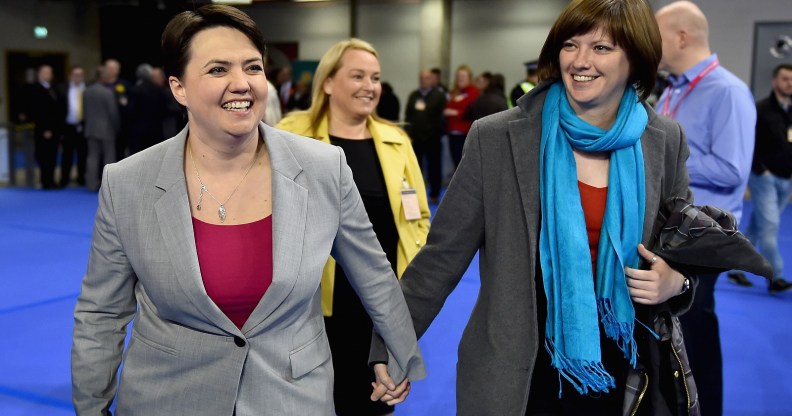Opposition to same-sex relationships drops drastically in Scotland

(Photo by Jeff J Mitchell/Getty Images)
The number of Scots who would be unhappy if a close relative were in a same-sex relationship has halved in five years.
The news comes from 2015’s Scottish Social Attitudes Survey, which was published today by the Scottish Government.
Unlike in other parts of the UK, which have recorded rises in anti-LGBT and racist sentiment, the study found that “there appears to be a trend towards people in Scotland holding more positive attitudes to diversity”.
It found that just under a fifth (18%) of people believed that ‘sexual relations between two adults of the same sex’ were wrong, while 59% insisted same-sex relationships were ‘not wrong at all’.
The proportion who say that same sex relationships are wrong has been declining steady over time since 2000, when nearly half (48%) believed that same sex relationships were wrong.
The survey also asked people how they would feel about a relative dating someone from different racial and religions backgrounds, someone who from time to time experiences depression, someone who has had a sex change operation, someone of the same sex as themselves, and someone who cross-dresses in public.

It found that people were most likely to say they would be unhappy about a close relative marrying someone who cross-dresses in public (39% said they would be unhappy) followed by someone who has undergone gender reassignment (32%) and a Gypsy/Traveller (31%).
However, the survey also noted a positive shift in attitudes towards a close relative marrying, forming a civil partnership or a long-term relationship with someone of the same sex as themselves. In 2010, 3 in 10 (30%) people said they would be ‘unhappy’ or ‘very unhappy’ about this; by 2015 this had halved to 1 in 6 (16%).
Hannah Pearson, Policy Coordinator at the Equality Network, said, “We very much welcome the continued increase in the majority of people in Scotland who respect and value equally their lesbian, gay and bisexual neighbours.
“Attitudes have changed very fast, and we think that’s in part due to the leadership shown by successive Scottish governments in promoting equality in the law. It’s also because a lot more people have come out.
“People are less likely to hold discriminatory attitudes if they have a friend or family member they know is lesbian, gay or bisexual. Only 15% of Scots now say they don’t know anyone lesbian or gay.”
James Morton, manager of the Scottish Transgender Alliance, said, “We are glad to see confirmation that prejudice towards trans people has fallen.
“Trans people remain the social group which the largest minority of people in the Social Attitudes Survey would be unhappy to see join their family.
“However, it is heartening to see much more positive views amongst younger people, and we look forward to the change in attitudes towards trans people continuing.”
Tim Hopkins, Equality Network Director, added: “In the Scottish LGBT Equality Report which we published last year, LGBT people identified negative social attitudes as a top issue.
“Although, as the Social Attitudes Survey shows, views towards the LGBTI community in Scotland have greatly improved over the years, many LGBTI people still face practical discrimination, and hate crime perpetrated by a small minority.
“More needs to be done to combat this.”

